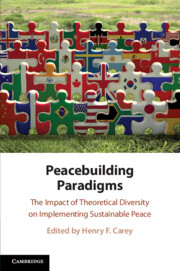Book contents
- Peacebuilding Paradigms
- Peacebuilding Paradigms
- Copyright page
- Contents
- Figures
- Tables
- Contributors
- Foreword
- Introduction Bridging the Conceptual and Theoretical Divides on Peace and Peacebuilding
- Part I The Realist Paradigm
- Part II The Liberal Paradigm
- Part III The Constructivist Paradigm
- Part IV The Cosmopolitan Paradigm
- Part V The Critical Theory Paradigm
- 11 Critical Approaches to Peacebuilding
- 12 A New Paradigm
- 13 From Scylla to Charybdis?
- Part VI The Locality Paradigm
- Part VII The Policy Paradigm
- Bibliography
- Index
11 - Critical Approaches to Peacebuilding
from Part V - The Critical Theory Paradigm
Published online by Cambridge University Press: 16 December 2020
- Peacebuilding Paradigms
- Peacebuilding Paradigms
- Copyright page
- Contents
- Figures
- Tables
- Contributors
- Foreword
- Introduction Bridging the Conceptual and Theoretical Divides on Peace and Peacebuilding
- Part I The Realist Paradigm
- Part II The Liberal Paradigm
- Part III The Constructivist Paradigm
- Part IV The Cosmopolitan Paradigm
- Part V The Critical Theory Paradigm
- 11 Critical Approaches to Peacebuilding
- 12 A New Paradigm
- 13 From Scylla to Charybdis?
- Part VI The Locality Paradigm
- Part VII The Policy Paradigm
- Bibliography
- Index
Summary
Critical approaches to understanding and practicing peacebuilding have arguably made contributions to the articulation of new understandings of conflict and new strategies of conflict management. Drawing upon a wide variety of theoretical interests and political convictions, critical approaches to peacebuilding often work at the intersection of Marxism, poststructuralism, postcolonialism, and gender/sexuality studies. Unlike traditional approaches toward peacebuilding that take their cues from mainstream debates in International Relations theory, critical approaches frequently decenter the state in their analysis and often highlight the essential role that would have to be played by subaltern identities, social movements, and revolutionary political change in the elaboration of a durable peace. Despite these clear contributions to the thought and praxis of peacebuilding, there does not exist a clearly defined school of thought that calls itself Critical Peace Studies. This chapter explores this seemingly paradoxical state of affairs — the absence of Critical Peace Studies per se despite its significant contributions — so as to understand the ways in which the diverse intellectual traditions that inform critical approaches to peacebuilding are markedly different from other approaches in this volume at the level of theory and the level of political practice.
- Type
- Chapter
- Information
- Peacebuilding ParadigmsThe Impact of Theoretical Diversity on Implementing Sustainable Peace, pp. 193 - 206Publisher: Cambridge University PressPrint publication year: 2020
- 1
- Cited by



